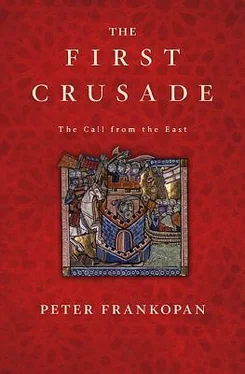These judgements were unjustified. On 4 March 1098, a few weeks after Tatikios had left, a fleet put in at St Simeon’s port bringing essential foodstuffs, provisions, reinforcements and materials to use against Antioch’s formidable defences. The timing of the fleet’s appearance was no coincidence. Nor was its identification by Bruno of Lucca, who sailed with it, as English; Alexios had established an English garrison in Laodikeia after its recapture, and it was presumably these men who now brought emergency supplies to Antioch. 17Tatikios had delivered what he had promised.
The reason why this was not acknowledged by the Crusaders and their chroniclers was that misgivings had already started to grow about the Byzantine role in the expedition. For one thing, with Tatikios absent, it was not clear to whom Antioch should be handed if and when it was taken, in accordance with the oaths given to Alexios in Constantinople. This led to unease amongst the western force, which began not only to question whether the Byzantines had lost faith in the operation, but also why the city was being besieged in the first place, at such heavy cost to the westerners. 18Antioch did have Christian significance; after all, it was the original see of St Peter. But its capture had little to do with the liberation of the Holy Sepulchre; why not simply advance to Jerusalem and leave Antioch to one side?
It appears that the Crusaders remained at Antioch in spite of the suffering because they were bound by the commitments they had made to the emperor who was providing the leadership of the expedition, albeit from a distance. Thus the oaths that the emperor had insisted upon were proving to be highly effective: they subjected the Crusade leaders to Alexios’ authority and gave the Byzantine ruler the power to set the military and strategic objectives of the expedition. The emperor evidently felt comfortable enough to think that it was not necessary to dispatch Tatikios back to the western camp, or to send a senior representative in his place to ensure that the obligations remained intact.
One reason for this was a major miscalculation on Alexios’ part concerning Bohemond. In Constantinople, Bohemond had been keen to position himself as a perfect foil for the emperor, the ideal righthand man who would protect the emperor’s best interests and mediate for him with the other main leaders of the expedition. On more than one occasion, he had done so successfully, intervening on Alexios’ behalf. 19If the emperor thought that Bohemond would continue to represent him faithfully, he was wrong.
By the spring of 1098, following the departure of Tatikios and in the absence of any Byzantine authority, Bohemond saw a golden opportunity. He began broaching the idea of a new agreement on the future of Antioch – one that did not involve Alexios. The suggestion he came up with was provocative: the oaths to the emperor were null and void, he said, since Alexios had not fulfilled his side of the agreement. The emperor had not accompanied the Crusaders in person; the small force he had sent with the knights had withdrawn; he had failed to provide military support in the hour of need; and he had not kept the knights supplied. In short, he was a traitor. 20
Bohemond concluded that Antioch should not be handed over to Alexios. He proposed that whoever was able to breach the walls and deliver the city should be allowed to claim personal control of it. Although he was given short thrift by his fellow leaders, who were wary of the Norman’s wider ambitions, Bohemond persisted. At the end of May 1098, he raised the issue of Antioch again.
This time, however, his audience was more receptive. Conditions in the Crusader camp had not improved and no progress had been made against the city’s defences. News had also been received that Kerbogha, the ambitious governor of Mosul, was approaching with a large army aiming to defeat the westerners once and for all. So well resourced were Kerbogha’s forces that the Latin and Greek sources assumed that it must have been funded and sent by the Seljuk sultan Barkyaruq himself. 21The crisis at Antioch was reaching its climax.
Intelligence reports on Kerbogha’s movements and objectives were so troubling that when the leaders met in council, they resolved to keep the news secret from their troops to avoid destroying morale and provoking mass desertion. Given these dire circumstances, Bohemond’s return to the question of the future of Antioch seemed misplaced; in the face of complete annihilation, the Norman persistently questioned the legal status of the oaths and made demands about the control of the city and the distribution of the spoils of victory. It seemed that Bohemond knew something the other leaders did not.
In fact, Bohemond had made a secret arrangement with an enemy captain, named Firouz, who was in charge of one of the defence towers along Antioch’s walls, to allow the Crusaders into the city. Some eyewitnesses reported that Bohemond had captured Firouz’s son and was holding him hostage. Others believed that Firouz had been inspired by God, and had had a vision instructing him to hand Antioch over to the Christians; that he was an Armenian with misgivings about the ill-treatment of the city’s inhabitants by the Turks; or that he was a man who could not resist the promise of a handsome reward. 22Whatever the case, Bohemond had found himself a trump card – and kept it hidden from the other leaders. His negotiations with Firouz would have been helped by the fact that both men spoke Greek, the latter the result of living in Byzantine Antioch, the former thanks to his upbringing in southern Italy – even if, as Anna Komnene sniped, Bohemond did have a terrible accent. 23
With Kerbogha bearing down on Antioch, Bohemond’s proposals about the fate of the city were again discussed. Raymond of Toulouse, the richest and most influential of the Crusade leaders, refused pointblank to give his approval to what he saw as an outright betrayal of the oaths sworn to the emperor in Constantinople. 24Raymond had been the most reluctant of all to give Alexios the undertakings demanded of him; now he was the most reluctant to break them.
Although most other leading Crusaders had misgivings about Bohemond’s proposals, he eventually extracted some support, albeit heavily qualified: it was agreed that if a single leader was able to take
Antioch, he could hold it. However, this would be on a strictly conditional and temporary basis; control of the city was ultimately to be ceded to Byzantium. The agreement was carefully recorded in writing. 25Attention now turned to the preparations for an all-out assault on the city – the final roll of the dice before Kerbogha’s army arrived.
On 2 June 1098, four days after the council of leaders, the Crusaders commenced their attack. They began by feigning the departure of a large contingent to put the defending garrison off guard. Returning silently under the cover of nightfall, the knights joined up with another detachment by the Gate of St George, led by Robert of Flanders and Godfrey of Bouillon. A smaller group took up position with Bohemond by the tower that was under the command of Firouz.
After establishing that the coast was clear, the first group of Bohemond’s men made their way up a ladder that had been secured to the top of the battlements. Firouz was waiting for them, as agreed. ‘ Micro Francos echomé! ’ he exclaimed in despair – ‘We have few Franks!’ As he saw it, there were nowhere near enough men to stand a chance of taking the city. 26
Getting up the ladder in the darkness was not easy, and it was not made any easier by the fact that too many eager attackers, including Fulcher, a Knight from Chartres, attempted to climb it at the same time. 27The weight of so many men caused the ladder to topple over, injuring some and making a terrific noise. Through a stroke of fortune, interpreted as a mark of divine protection, a strong wind muffled the sound, and the ladder was once again raised and the attackers clambered up as fast as they could. 28Assembling at the top, the Crusaders made their way along the walls in silence, killing those they met until they were in position to signal to Godfrey and Robert of Flanders, who were waiting below, that the time had come to storm one of the city’s gates. 29
Читать дальше











